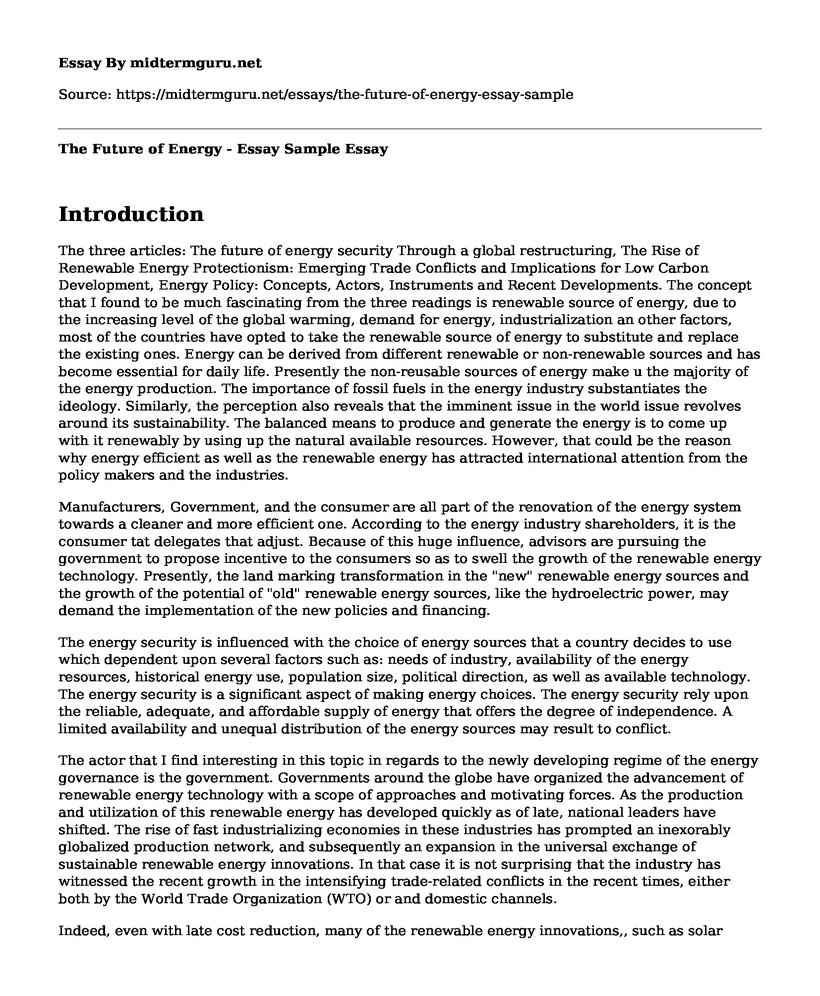Introduction
The three articles: The future of energy security Through a global restructuring, The Rise of Renewable Energy Protectionism: Emerging Trade Conflicts and Implications for Low Carbon Development, Energy Policy: Concepts, Actors, Instruments and Recent Developments. The concept that I found to be much fascinating from the three readings is renewable source of energy, due to the increasing level of the global warming, demand for energy, industrialization an other factors, most of the countries have opted to take the renewable source of energy to substitute and replace the existing ones. Energy can be derived from different renewable or non-renewable sources and has become essential for daily life. Presently the non-reusable sources of energy make u the majority of the energy production. The importance of fossil fuels in the energy industry substantiates the ideology. Similarly, the perception also reveals that the imminent issue in the world issue revolves around its sustainability. The balanced means to produce and generate the energy is to come up with it renewably by using up the natural available resources. However, that could be the reason why energy efficient as well as the renewable energy has attracted international attention from the policy makers and the industries.
Manufacturers, Government, and the consumer are all part of the renovation of the energy system towards a cleaner and more efficient one. According to the energy industry shareholders, it is the consumer tat delegates that adjust. Because of this huge influence, advisors are pursuing the government to propose incentive to the consumers so as to swell the growth of the renewable energy technology. Presently, the land marking transformation in the "new" renewable energy sources and the growth of the potential of "old" renewable energy sources, like the hydroelectric power, may demand the implementation of the new policies and financing.
The energy security is influenced with the choice of energy sources that a country decides to use which dependent upon several factors such as: needs of industry, availability of the energy resources, historical energy use, population size, political direction, as well as available technology. The energy security is a significant aspect of making energy choices. The energy security rely upon the reliable, adequate, and affordable supply of energy that offers the degree of independence. A limited availability and unequal distribution of the energy sources may result to conflict.
The actor that I find interesting in this topic in regards to the newly developing regime of the energy governance is the government. Governments around the globe have organized the advancement of renewable energy technology with a scope of approaches and motivating forces. As the production and utilization of this renewable energy has developed quickly as of late, national leaders have shifted. The rise of fast industrializing economies in these industries has prompted an inexorably globalized production network, and subsequently an expansion in the universal exchange of sustainable renewable energy innovations. In that case it is not surprising that the industry has witnessed the recent growth in the intensifying trade-related conflicts in the recent times, either both by the World Trade Organization (WTO) or and domestic channels.
Indeed, even with late cost reduction, many of the renewable energy innovations,, such as solar power and wind technologies, need a different kind of the government support to offer their support in order to be deployed. Whereas any type of direct government reinforcement that establishes an appropriation could keep running into dispute with international trade rules,, the projects expect to at the same time encourage the development of a domestic manufacturers industry which are most in danger of such clash.
The superstructure and base of the present energy regime are getting unsustainable. With numerous stakeholders joning the energy industry, supplies need to grow rapidly. The extension of energy supplies from new sources turns into the fundamental condition for worldwide energy security. The size of development required to build another worldwide energy mix must be cultivated through a global approach. It is a global inquiry on the grounds that the concerned partners are situated in various districts comprising of various globalizing economies.
Expanding coordination and relationship among the energy suppliers and consumers, and the area of the operations fo the energy industry in the international markts, has required the redefinition of energy security both at the applied and strategy level. The fate of energy security must be characterized in regards to the global energy regime and frameworks. A global rebuilding of energy framework would unavoidably accept global commitment, global norms and global partnership as well as institutions.
Cite this page
The Future of Energy - Essay Sample. (2023, Jan 01). Retrieved from https://midtermguru.com/essays/the-future-of-energy-essay-sample
If you are the original author of this essay and no longer wish to have it published on the midtermguru.com website, please click below to request its removal:
- Discussion Questions: Governments Policies Effects on the Economic
- Reasons for Obamas Election Victory - Essay Example
- Evaluation of a President Franklin D Roosevelt - Paper Example
- The Birth of a Nation: Movie Review Paper Example
- Essay Sample on Environmental Regulations, Standards, and Agreements
- Democracy in the Contemporary World: The Role of Media - Essay Sample
- Compare and Contrast Essay on Jeffersonian and Jacksonian Democracy







